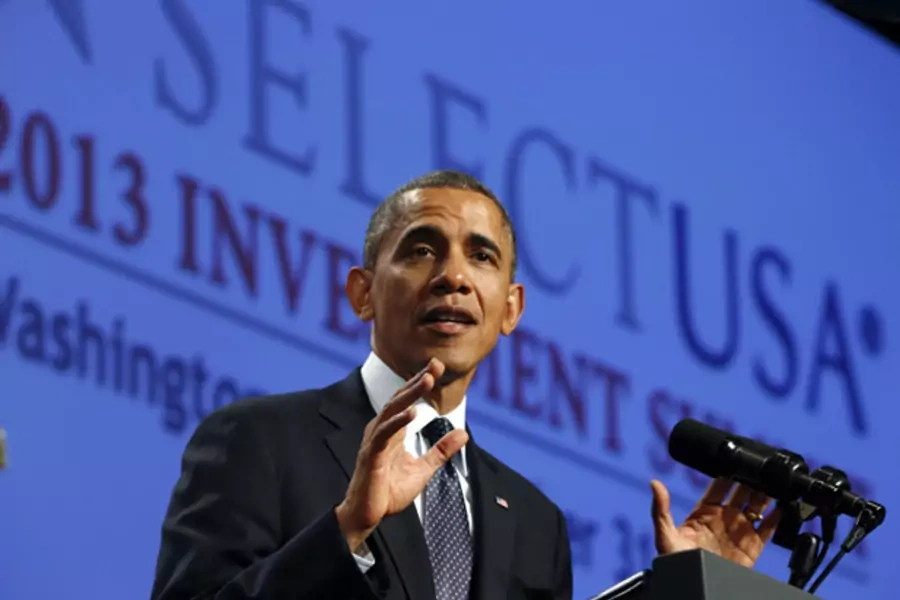What's Behind Obama’s Push to Attract Foreign Businesses?

More on:
Last week the Obama administration hosted the first-ever national summit showcasing the United States as an attractive place to do business, part of a newish initiative called SelectUSA. The event was sold out. In attendance were hundreds of representatives from foreign companies along with U.S. local and state government officials looking to attract their business. The speaker lineup was stacked to impress. President Obama and the secretaries of Commerce, Treasury, and State all separately graced the podium. Panels were filled with big-time CEOs from companies like Dow, Caterpillar, and Walmart. The event’s message: the United States is “open for business” and the Obama administration is serious about it.
The usual competitiveness topics were covered, from STEM education to infrastructure to R&D spending. But the event did add some new flavor to the debate. Five observations:
Obama’s now positive on U.S. competitiveness. For years, the Obama administration—along with most of the D.C. policy establishment—has been fairly negative about the state of U.S. economic competitiveness, focusing mostly on the challenges (e.g., budget deficits, underfinanced infrastructure, poor test scores). The SelectUSA summit signals a very clear and loud shift in the other direction, focusing on the positives. Secretary of Treasurey Jack Lew gave a 30 minute presentation talking only about everything that’s going right for the United States. Two panels with Fortune 500 CEOs were just as upbeat. While the conference was obviously intended to put the best possible face on the United States as a place to do business, it does appear that the Obama administration is reframing its take on U.S. competitiveness.
A new mercantilism? At the summit, Secretary of State John Kerry proclaimed, “foreign policy is economic policy.” The job of the State Department is to advance U.S. interests abroad, and many would assume that that included U.S. economic interests as well. But rarely have U.S. officials so publicly and so affirmatively made such a claim. Kerry’s speech is a signal that he intends to build on the “economic statecraft” theme advanced by his predecessor Hillary Clinton. Just as revealing is the radio silence from the economic conservatives and libertarians who in the past would have bristled at such explicitly mercantilist language.
The strength of the U.S. banking sector. Larry Fink, the CEO of the world’s biggest equity investment firm BlackRock, gave rave reviews of the U.S. banking sector and loan market. The relative health and stability of U.S. banks coming out of the crisis does not get enough attention in the press. The United States quickly resolved its banking crisis four years ago, while the Europeans are still mucking around in theirs. Fink gives the Sarbanes-Oxley Act enormous credit, even if at the time it was enacted in 2002 it was deeply unpopular. Ten years later, he says investors are more confident in banking and accounting regulations and can make better investment decisions. Wall Street is also still the center of global finance; five years ago, the talk was of trends pointing to a future dominated by London, Hong Kong or Singapore.
Compared to twenty years ago, the United States has had a change of heart about manufacturing. Andrew Liveris, the CEO of Dow, made a great point on this. In the not too distant past, Americans were not so attached to manufacturing, which was considered old, dirty, tired, economically rudimentary, and not necessarily something that needed to be preserved. Manufacturing interests—unions, workers, management, government—were locked in contentious battles and did not form a united political front. Nor was there a popular sense that innovation and wealth-creation would head overseas with manufacturing. Now the national conversation has changed. Practically every American politician praises manufacturing and understands that where production moves, innovation follows. Liveris expects that this shift in mood will compel the U.S. government into action to prevent manufacturing and innovation from moving abroad.
Foreign policymakers are perplexed by the U.S. obsession with U.S. decline. The CEO panelists said that when they are abroad foreign policymakers always ask why the United States isn’t more bullish about itself. To them, the United States is far and away the best place to invest, and they would do anything to have the assets the United States has. Healthy self-criticism is always great, but the United States needs to keep its problems in perspective.
More on:
 Online Store
Online Store